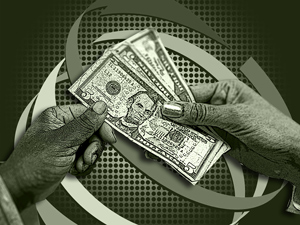By Laila Muhammad
I was talking to a friend not too long ago, and he told me about a particular natural healing product to help me over a cold. My first question was how much did it cost? Before he answered he gave me a break down of all its benefits, how it was produced by Black folks, more details and then the price. This very detailed description didn’t have any bearing on me on the moment, I was under the weather and I needed something quick, cheap, familiar, and close to my home. So to the local drug store I went.

A few days later I was feeling better, but I couldn’t shake the feeling that I had cheated my own people in the process.
I called him back and wanted to justify my reasons for not “buying Black” as we call it in our community or supporting Black-owned businesses. I explained feverishly that I’m a single mother, I work long hours, I take classes. And I’m just too busy to invest time researching products I’ve never heard of and not quite sure will work. Black-owned products cost too much, and are not easily available, and on and on. Those are the main excuses Black people give when asked why they don’t often support Black businesses, he observed. I paused.
Could he be right? Had I made a conscious effort to research and seek out Black businesses? Nope, not really. I decided to make a resolution to do as the Honorable Elijah Muhammad and the Honorable Minister Louis Farrakhan have been imploring us to do for the past 80 years … spend our money among ourselves.
According to an article on the HuffingtonPost.com titled Black Spending Power Still Vital, Still Growing, Nielsen reported a follow up to its 2011 landmark “State of the African-American Consumer” report, which projected Black buying power will reach $1.1 trillion by the year 2015. Nielsen and National Newspaper Publishers Association, the trade group for weekly Black-owned newspapers, examined our spending habits.
“Dynamic influencing factors–such as technology, social media and online connectivity–enable the Black consumer segment to leverage its collective power and influence,” the report says. It also noted that as a group, Blacks have spending habits and brand loyalty that advertisers love.

To illustrate how massive this figure is, if Black America’s purchasing power was equated to a country’s GDP, we would be the 16th largest richest in the world!
While researching some Black-owned companies I stumbled across Maggie Anderson, co-founder of the Empowerment Project. She and her family decided to commit to “buying Black” for an entire year. In a book titled, “Our Black Year,” Anderson recounts her experiences patronizing Black-owned businesses while highlighting the challenges many Black businesses face.
Long before the Anderson family experiment, the inventor George Washington Carver noted, “We have become ninety-nine percent money mad. The method of living at home modestly and within our income, laying a little by systematically for the proverbial rainy day which is due to come, can almost be listed among the lost arts.”
But there is good news, numerous companies and websites are available to help us on the journey to pool our resources and keep our money in our own community. The Three Year Economic Savings Program was established by the Honorable Elijah Muhammad in 1964. This program called for Black people to pool their resources by contributing $10 a month to help fight against poverty, want, unemployment, abominable housing, hunger and nakedness of the 30-40 million Black people in America. Minister Louis Farrakhan re-established this program in October 1991 because we continue to face these same problems today.
In February, the Minister issued a call to back Muhammad’s Economic Blueprint by contributing .35 a week. There is a desire to use the money to purchase farmland as the foundation for the economic survival of our people.
Other companies and resources I suggest are The African American Business Directory, Beansouptimes.com,BlackBusinessnetwork.com, Carolsdaughter.com, and Chicago businesses Brown Sugar Bakery, Haiku Art Gallery, and Cupcake Gangsters.
So will you embark on a journey with me? For 30 days, please strive to “Buy Black” whenever possible, document your success, and send your pictures and brief stories to [email protected]
Laila Muhammad is a Chicago-based writer and videographer.












